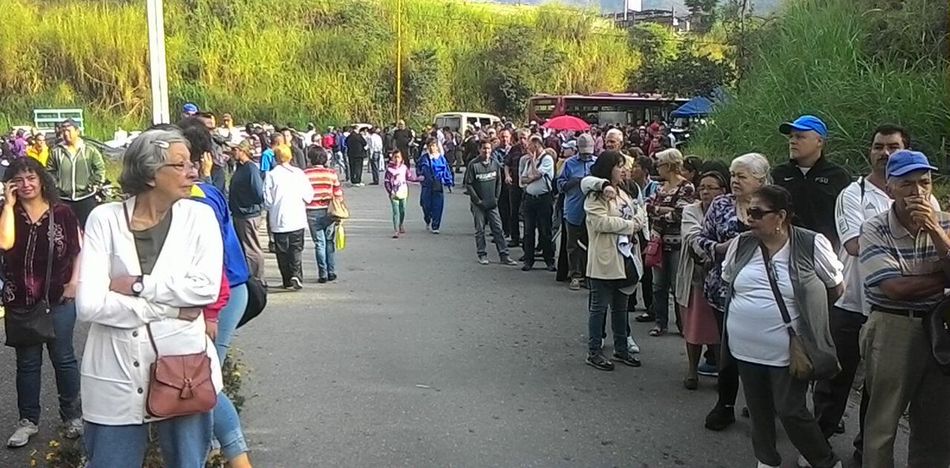
EnglishAfter months of confrontation and protests, the Venezuelan dictatorship and its political opposition meet once again at the polls to choose the governors of the country’s 23 regional states.
These elections had been postponed for almost year by the unpopular Maduro regime in an attempt to avoid an almost certain defeat, but it has actually become a test of how many disillusioned Venezuelans still trust the coalition of opposition parties Democratic Unity Roundtable (MUD).
MUD candidates stand to win the majority of governorships, results not seen in in 17 years, which would mean a hard blow to the ruling United Socialist Party of Venezuela (PSUV).
The opposition has a chance to show it has kept the support of Venezuelan voters since the December 2015 parliamentary election, when it gained a supermajority of 112 seats in the National Assembly against just 55 for the ruling coalition.
However, it is uncertain whether the dictatorship will allow opposition governors to rule.
Venezuela’s strongman Nicolás Maduro has warned all those elected must swear allegiance to the National Constituent Assembly, an illegitimate body charged with writing a new Constitution that is composed only of regime loyalists and that dissolved the opposition-controlled National Assembly.
The MUD has dismissed the threats and said it will not acknowledge the authority of the Constituent Assembly.
Even though many other obstacles leading up to election day have been put in place by National Electoral Council, the opposition has called upon Venezuelans not to let them be intimidated and come out to vote.
The decision to participate in the election itself has been a source of controversy among Venezuela’s opposition, some calling the process “rigged” and only useful to give the Maduro dictatorship an excuse to call itself democratic.
However, leaders of the MUD alliance argued that abstaining from voting means handing 23 governorships to the regime on a silver plate —more power.
Regional Elections in Venezuela
Over 18 million Venezuelans are eligible to vote at these regional elections. Voting booths remained open from 6:00 AM until 6:00 PM local time, although closing time could be extended if people are still waiting in line inside the premises.
At the last minute, the National Electoral Council eliminated 76 polling stations and over 7,000 voting tables. It also relocated 700,000 Venezuelans to different stations, which has been denounced as an attempt to supress opposition votes.
#EleccionesRegionales2017│Electora molesta por reubicación en el Llanito. Están trasladando a los votantes a Petare. Vía @GabyGabyGG pic.twitter.com/Zr24QGH2cl
— El Nuevo País y Zeta (@enpaiszeta) October 15, 2017
“It has long been the strategy of the National Electoral Council to confuse voters. It’s a systematic policy basically targeted to those electoral districts with high opposition turnout,” said Héctor Briceño, a researcher at the Center for Development Studies at the Central University of Venezuela.
Bumpy Start
Early on, Venezuelans took to social media to denounce irregularities. At 8:15 AM local time, a polling station in Caracas was still closed because the voting machines had not been installed.
Colegio Libertador en Chacao, no han podido ingresar a votar porque no se han instalado las máquinas 8:15am #EleccionesRegionales2017 pic.twitter.com/VRmbskeHQq
— Efecto Cocuyo (@EfectoCocuyo) October 15, 2017
At another station, appointed opposition observers were reportedly not allowed inside.
6.05 am. Denuncio que en el Centro de Votación Antonio Nicolás Briceño,no dejan pasar a los testigos de la Unidad. #EleccionesRegionales2017
— Elimar Díaz G. (@ElimarDiazG) October 15, 2017
Instances of voter intimidation and illegal campaigning by the ruling party were also among the complaints of Venezuelans.
Toldo del Psuv hace proselitismo frente al centro Jardín de Infancia Verónica Coello de Petare 7:47am #EleccionesRegionales2017 pic.twitter.com/sUoDfRTpqj
— Efecto Cocuyo (@EfectoCocuyo) October 15, 2017
Sources: El Nacional, Infobae, DW, ABC, Infobae, Europapress.
 Versión Español
Versión Español












